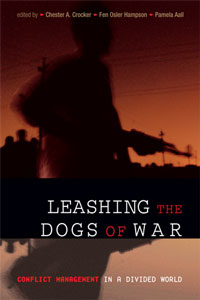Leashing the Dogs of War
Conflict Management in a Divided World
Edited by Chester Crocker, Fen Osler Hampson and Pamela Aall, United States Institute of Peace, January, 2007
|
Leashing the Dogs of War assesses the nature and extent of the changes wrought by 9/11 and its aftermath, and explores their wide-ranging implications... At the same time, some things have not changed. Failed states, economic stagnation, weapons proliferation, nuclear missiles, and identity-based conflicts continue to threaten global security.
|
Publisher's blub:

Since Turbulent Peace was first published in 2001, the international landscape has changed profoundly. Leashing the Dogs of War replaces its well-established predecessor as the definitive volume on the sources of contemporary conflict and the array of possible responses to it. The authors—more than forty of the most influential and innovative analysts of international affairs—present multiple perspectives on how best to prevent, manage, or resolve conflicts around the world.
Leashing the Dogs of War assesses the nature and extent of the changes wrought by 9/11 and its aftermath, and explores their wide-ranging implications. For the United States, of course, the changes have been dramatic. It has engaged in a war on terrorism and has become both a third party in certain conflict arenas and a direct party to the conflict in Iraq and Afghanistan. But these events have also affected other actors, from the United Nations to humanitarian NGOs to collective defense and security organizations such as NATO and the OSCE.
At the same time, some things have not changed. Failed states, economic stagnation, weapons proliferation, nuclear missiles, and identity-based conflicts continue to threaten global security. Looking at the combination of old and new threats, are traditional instruments of negotiation, mediation, peacekeeping and peace enforcement still effective in managing and resolving conflict? How do conflict management efforts and the campaign against terrorism interact in various security environments? Are our institutions—be they states, coalitions of the willing, international organizations, or NGOs—capable of creating and implementing a peacemaking strategy? All these questions are addressed in this new volume.
Authoritative, provocative, and insightful, Leashing the Dogs of War offers an unparalleled breadth and depth of analysis of conflict in today’s world. It is a “must read” not only for students of international relations and conflict resolution but also for anyone—in government and outside—seeking to understand the dynamics of contemporary conflict and the best means of resolving it.
---------------------------------------------------------------------------------------------------
Contents
Foreword - Richard H. Solomon
Part I Introduction
1. Leashing the Dogs of War, - Chester A. Crocker, Fen Osler Hampson, and Pamela Aall
Part II Sources of Conflict and Challenges to Global Security
2. International Sources of Interstate and Intrastate War - Jack S. Levy
3. New Global Dangers - Michael E. Brown
4. Arms Acquisition and Violence: Are Weapons or People the Cause of Conflict? - Geoffrey Kemp
5. Terrorism and Global Security - Martha Crenshaw
6. The Challenge of Weak, Failing and Collapsed States - Robert Rotberg
7. State Making, State Breaking, and State Failure - Mohammed Ayoob
8. Power, Social Violence, and Civil Wars - Charles King
9. Minorities, Nationalists, and Islamists: Managing Communal Conflict in the Twenty-First Century - Ted Robert Gurr
10. Turbulent Transitions: Why Emerging Democracies Go to War - Edward D. Mansfield and Jack Snyder
11. Environmental Change, Security, and Conflict - Nils Petter Gleditsch
12. Economic Causes of Civil Conflict and Their Implications for Policy - Paul Collier
13. Motivations for Conflict: Groups and Individuals - Frances Stewart and Graham Brown
Part III Uses and Limits of Force in Conflict Management
14. Using Force for Peace in the Age of Terror - Lawrence Freedman
15. Limits on the Use of Force - Brian Urquhart
16. Yet Again: Humanitarian Intervention and the Challenges of “Never Again” - Bruce W. Jentleson
17. Coercive Diplomacy - Robert J. Art
18. Expanding Global Military Capacity to Save Lives with Force - Michael O’Hanlon
19. Economic Sanctions and International Peace and Security - Chantal de Jonge Oudraat
Part IV Uses and Limits of Statecraft, Diplomacy and Soft Power in Conflict Management
20. The Place of Grand Strategy, Statecraft, and Power in Conflict Management - Chester A. Crocker
21. A Framework for Success: International Intervention in Societies Emerging from Conflict - Daniel Serwer and Patricia Thomson
22. The Place of Soft Power in State-Based Conflict Management - Joseph S. Nye, Jr.
23. Rule of Law in Conflict Management - Neil Kritz
24. Rethinking the "War on Terror": New Approaches to Conflict Prevention and Management in the Post-9/11 World - Paul B. Stares and Mona Yacoubian
25. International Mediation - I. William Zartman and Saadia Touval
26. Contemporary Conflict Resolution Applications - Louis Kriesberg
27. The Power of Nonofficial Actors in Conflict Management - Pamela Aall
Part V Uses and Limits of Institutions in Conflict Management
28. The United Nations and Conflict Management: Relevant or Irrelevant? - Karen A. Mingst and Margaret P. Karns
29. Successes and Challenges in Conflict Management - Andrew Mack
30. New Roles for Regional Organizations - Paul F. Diehl
31. Capacity and Limits of NGOs as Conflict Managers - Diana Chigas
32. War and Law: The Dilemmas of International Law and Coercive Enforcement - Ruth Wedgwood
Part VI Uses and Limits of Governance in Conflict Management
33. Is Democracy the Answer? - Marina Ottaway
34. Is Stability the Answer? - Kimberly Marten
35. Economic Factors in Civil Wars: Policy Considerations - David Malone and Jake Sherman
36. Sharing Sovereignty: New Institutions for Collapsed and Failing States - Stephen Krasner
37. Intervention and the Nation-Building Debate - Fen Osler Hampson and David Mendelof
|
 Home
Home Archives
Archives